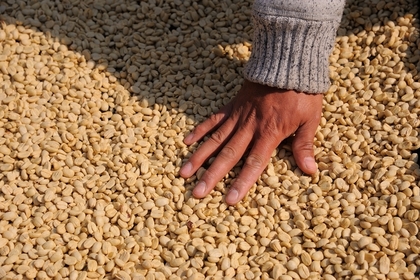Indonesia's coffee production has dropped by 30% this year, and coffee demand has increased by an average of 10% a year.

For professional baristas, please follow the coffee workshop (Wechat official account cafe_style)
By the third quarter of this year, national coffee production has dropped by an average of 25% to 30%. Coffee production has dropped sharply due to unstable weather and insect attacks on coffee production centers across the country, and coffee plantations in the eastern part of our country have been the most affected.
A few days ago, Paranodo, vice chairman of the Indonesian Coffee exporters Association (AEKI). Pranoto Soenarto told reporters that coffee garden centers in Sumatra, such as Lampung and Java, are the only hope, as the weather in Java and Sumatra is relatively better than in other areas.
Paranado claimed that at present, China's average coffee production per hectare (ha) is about 600kg to 800kg, which is different from that of other countries, such as Vietnam, which produces an average of 2.3kg per hectare and Brazil produces an average of 8 tons per hectare. "our production capacity is very low. If we start to improve from now on, we will not see results until at least five years later. What I hope is that our country can produce 1.2 to 1.5 tons per hectare, so that farmers can prosper."
Paranodo stated that although the output is still low, the coffee produced in our country, especially Arabika, is still very expensive, with a price of US $5 to US $6 per kilogram in the global market, so more and more farmers are moving to grow special coffee, although special coffee has to choose the best coffee seeds and needs to be treated differently from ordinary coffee.
He explained that at present, only 30 per cent of China's special coffee production comes from Arabica coffee, while the remaining 5 per cent is robusta coffee (kopi Robusta).
Syafrudin, president of the Indonesian Association of Special Coffee Merchants (AKSI), added that at a time when coffee production was falling, demand for special coffee was still rising by an average of 8 to 10 per cent a year, not only from the export market, but also from the domestic market.
At present, there are many cafes in several parts of the country, and our people's love for coffee has also begun to increase. "although production is lower, there is still a market for special coffee, which can also improve the welfare of coffee farmers."
Last year, China produced only 690000 1000 tons of coffee, which is far below the annual production of 840000 tons in Colombia (Kolombia), 1.6 million tons in Vietnam and 3 million tons in Brazil.
Important Notice :
前街咖啡 FrontStreet Coffee has moved to new addredd:
FrontStreet Coffee Address: 315,Donghua East Road,GuangZhou
Tel:020 38364473
- Prev

The rise of pet coffee shops is causing "humanitarian" controversy.
Professional baristas Please follow the Coffee Workshop (Wechat official account cafe_style) Pet Coffee shops are springing up all over the world, and people hope to reduce stress by getting along with cute things. Behind the cute animals acting cute at the guests' midday meal is a perhaps inexplicable humanitarian dispute. Owl coffee shops in Japan are doing brisk business. The cute things in the coffee shop are eye-catching.
- Next

If you want to drink Tartine coffee, you don't have to go to the Bay area! There's something to drink when you get here!
The exchange of professional baristas please follow the coffee workshop (Wechat official account cafe_style) Pic via Tartine although friends who like coffee and pastry in Los Angeles are still waiting for the opening of the DTLA branch of the Bay area's famous Tartine bakery in 2018, but now you can experience the delicious impact brought by the Tartine team in advance! Extended reading [beauty]
Related
- Can lightly roasted coffee beans be used to extract espresso? How finely should you grind high-quality coffee beans to make Italian latte?
- What is the difference between the world's top rose summer coffee and Yejia Shefi? What are the flavor characteristics of Yega Shefi coffee and Panama rose summer?
- The ceremony is full! Starbucks starts to cut the ribbon at a complimentary coffee station?!
- A whole Michelin meal?! Lucky launches the new "Small Butter Apple Crispy Latte"
- Three tips for adjusting espresso on rainy days! Quickly find the right water temperature, powder, and grinding ratio for espresso!
- How much hot water does it take to brew hanging ear coffee? How does it taste best? Can hot water from the water dispenser be used to make ear drip coffee?
- What grade does Jamaica Blue Mountain No. 1 coffee belong to and how to drink it better? What is the highest grade of Blue Mountain coffee for coffee aristocrats?
- What are the flavor characteristics of the world-famous coffee Blue Mountain No. 1 Golden Mantelin? What are the characteristics of deep-roasted bitter coffee?
- Can I make coffee a second time in an Italian hand-brewed mocha pot? Why can't coffee be brewed several times like tea leaves?
- Hand-brewed coffee flows with a knife and a tornado. How to brew it? What is the proportion of grinding water and water temperature divided into?

